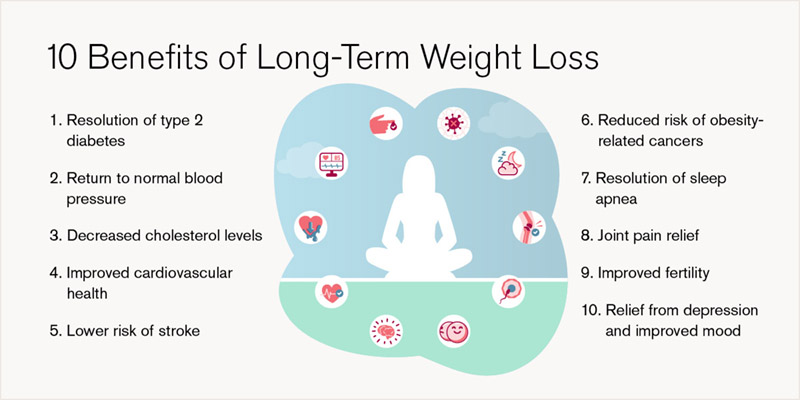Debunking Common Myths about Bariatric Surgery
April 7, 2025
Categories: Bariatrics
Tags: Bariatric Medicine, Bariatric Surgery, Weight Management, weight loss
 By Kevin Brown, MD, Bariatric Surgery
By Kevin Brown, MD, Bariatric Surgery
Bariatric surgery is often misunderstood. While it has helped countless individuals regain control of their health, many myths persist, preventing people from considering it as a viable option.
Loyola Medicine bariatric surgeon, Kevin Brown, MD, debunks the myths surrounding bariatric surgery and highlights surgical weight loss as a powerful tool for long-term weight management and health improvement.
Myth #1: Bariatric surgery is the “easy way out” for weight loss
A common misconception is that weight loss surgery is a shortcut or an effortless solution. The reality? Bariatric surgery is a tool, not a magic fix. Patients must commit to significant lifestyle changes, including long-term dietary modifications, regular exercise, and behavioral changes to sustain weight loss.
According to Dr. Brown, patients undergo a rigorous evaluation process before even qualifying for surgery.
“Patients typically spend six to 12 months meeting with psychiatrists, dietitians, and medical bariatricians. It’s a process that requires commitment and preparation — it’s not an easy task at all.”
Additionally, genetics, environment, and social factors all contribute to obesity, meaning that for many, diet and exercise alone may not be enough. Bariatric surgery offers a medical intervention that allows individuals to manage their weight more effectively in the long term.
Myth #2: You must choose between weight loss medication or bariatric surgery, not both
Many people believe that weight loss medications and surgery are mutually exclusive. However, they often work hand in hand.
“For some patients, we prescribe weight loss medications before surgery to help them lose weight in preparation. Others may benefit from medication after surgery to support their progress,” explains Dr. Brown.
Loyola Medicine offers a comprehensive weight management program, integrating both surgical and non-surgical options to maximize success.
Myth #3: Insurance won’t cover weight loss medications or surgical weight loss
The assumption that bariatric surgery is never covered by insurance can deter many from considering it. However, while coverage varies, many insurance plans provide partial or full coverage for weight loss treatments.
Loyola Medicine’s team works closely with patients and insurers to explore coverage options, ensuring that financial concerns don’t stand in the way of necessary medical care.
Myth #4: Bariatric surgery is just cosmetic
Some assume weight loss surgery is purely for aesthetic reasons, but its impact extends far beyond appearance. Bariatric surgery treats serious health conditions linked to obesity, including type 2 diabetes, hypertension, high cholesterol and sleep apnea. It also reduces risk factors for obesity-related cancers.
“For most of our patients, surgery isn’t just about looking better—it’s about feeling better and improving their quality of life,” says Dr. Brown.

Myth #5: You cannot get pregnant after bariatric surgery
Another common fear is that bariatric surgery makes pregnancy impossible. While a waiting period of about 12 to 18 months post-surgery is recommended, many women find that their fertility improves after significant weight loss.
Weight loss can help regulate hormonal imbalances and conditions such as polycystic ovary syndrome (PCOS), which can contribute to infertility. Many patients successfully conceive and have healthier pregnancies after surgery.
Myth #6: Bariatric surgery leaves large scars and requires a long recovery
Thanks to minimally-invasive techniques, modern bariatric procedures involve small incisions and faster recovery times than many expect.
“The majority of our patients only require an overnight hospital stay and can return to normal activities within a few days, to a couple of weeks,” says Dr. Brown.
Laparoscopic and robotic-assisted techniques allow for precise, effective surgery with minimal scarring, reducing discomfort and downtime. Many people also wonder what life will be like post-surgery. While portion sizes decrease, patients gradually adjust to a balanced diet.
Loyola's holistic approach to weight loss surgery supports your health goals
“The key factor in long-term success is lifestyle change,” Dr. Brown emphasizes. “Patients who maintain healthy eating habits and stay active are more likely to keep the weight off.”
Loyola Medicine offers a multidisciplinary team to support patients before, during, and after surgery, including:
- Psychologists to help improve healthy eating habits and behavioral changes.
- Dietitians to guide patients through pre- and post-surgery nutrition.
- Medical bariatric specialists to monitor weight trends and manage medications.
- Support groups for continued encouragement and accountability.
“It’s a holistic approach—patients aren’t left to figure it out on their own,” Dr. Brown explains.
If you’re considering weight loss surgery, attend a free online weight loss seminar to meet Loyola Medicine’s expert bariatric team and explore your options.
Please click on the button below to complete the seminar registration form. You will receive a confirmation email once your registration has been accepted.
Kevin Brown, MD, is a Loyola Medicine general surgeon specializing in bariatric minimally invasive surgery. As an expert in weight reduction he performs surgery, including gastric sleeve and gastric bypass. He works with a multidisciplinary team to help patients achieve their weight loss goals. Using robotic surgery and minimally invasive surgery techniques, he also performs various abdominal surgeries including hernia repairs.
